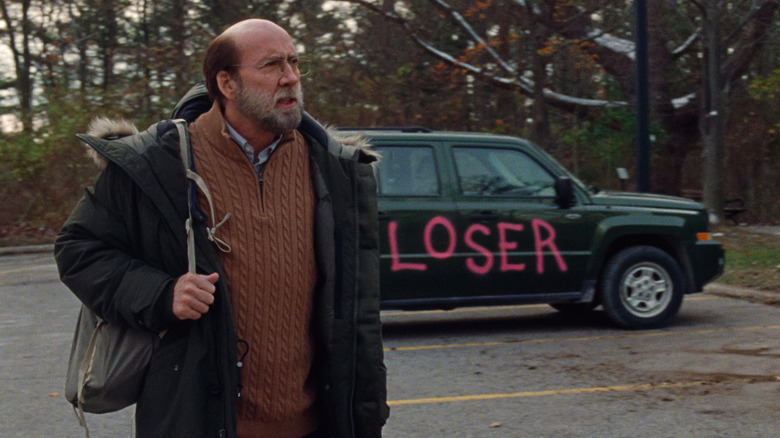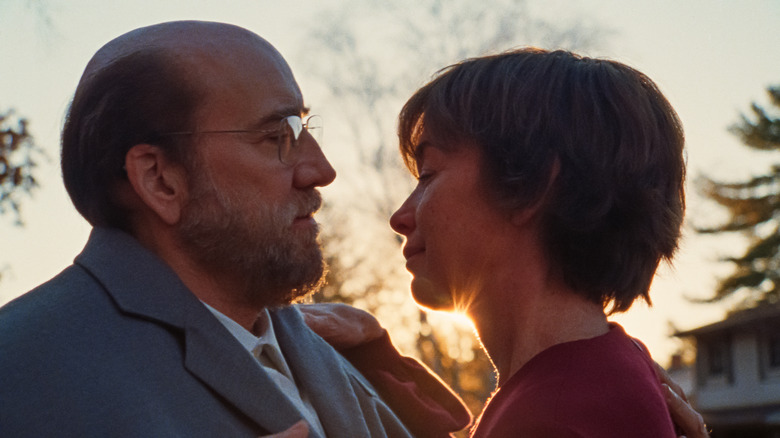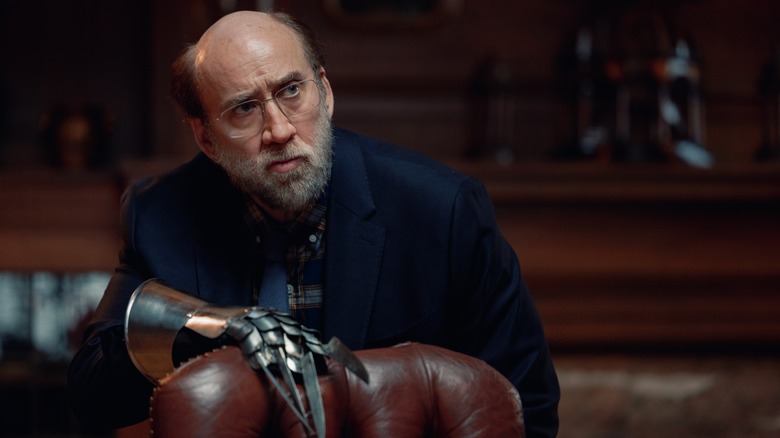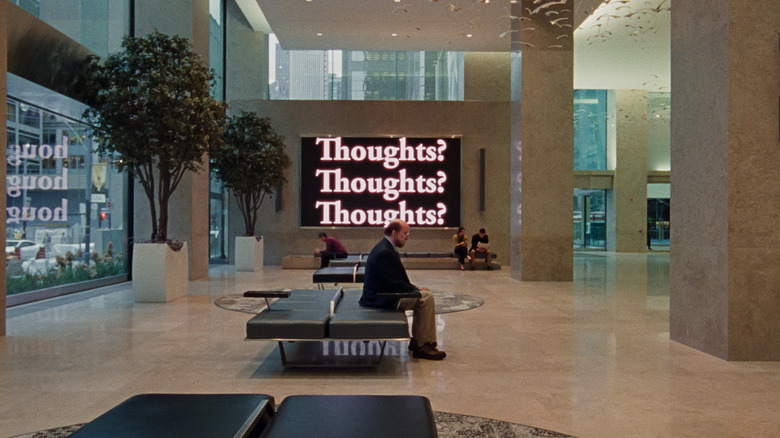Dream Scenario Director Kristoffer Borgli Knows How To Weaponize Nicolas Cage [Exclusive Interview]
One of the most surprising things I learned about "Dream Scenario" director Kristoffer Borgli is that he's not online. After all, his new film — a dark, fantastical comedy about an ordinary man (Nicolas Cage) who starts appearing in the dreams of strangers around the world — is a metaphor for the modern internet experience, specifically when someone gets famous for the right or wrong reasons on social media. Anyone unfortunate enough to still be using Twitter in 2023 knows the patterns "Dream Scenario" is twisting. It's sharp satire, and perhaps the first movie to truly explore the perils of internet fame. Maybe it takes an outsider to see the full picture, and an outsider to realize the dream of social media has truly transformed into a nightmare.
I sat down with Borgli at Fantastic Fest in Austin, Texas, where "Dream Scenario" played as a secret screening (the film hits theaters on November 10, 2023 courtesy of distributor A24). During our conversation, we talked about "The Twilight Zone," the perils of tweeting, cosmic horror, and yes, casting an actor as outlandish as Nicolas Cage as a character who is, by design, intended to be a boring nobody.
Note: This interview has been lightly edited for clarity and brevity.
'I've seen writings about how painful it is to get famous, that it can be really a negative experience'
I'll tell you how much your movie got under my skin. I did what most critics do after a movie: I pulled out my phone and went to tweet my reaction, but couldn't bring myself to do it. I was putting myself straight into the shoes of the character from the film. I was thinking about the consequences of saying anything.
Right, yeah.
Was "Dream Scenario" inspired by a similar experience for you?
No, I don't think I've personally had any feelings like that. I think I've been kind of under the radar for so long, for most of my life. I think it was more from observation and just kind of looking at the culture and what feels like the cost of engagement. I've seen writings about how painful it is to get famous, that it can be really a negative experience. There's something just interesting about that in combination with how easy it is to stumble upon it these days, like accidentally getting famous or recognized or become sort of a phenomenon. That probably is really, for some people, difficult to navigate. I thought about my father, who's a professor, the kind of comedic premise of him getting thrown into a phenomenon like this and how impossible it would be for him to navigate it correctly.
As somebody who's unfortunately online and wish I wasn't a lot of the time, the film is an incredible depiction of the "always online" experience, even though it's a fantasy or sci-fi movie. As someone who's not online, how did you tap into that?
I mean, it's more like it's unavoidable to see the pile-ons and the backlash and the apologies. It's just the playbook, almost, it feels like. I think I thought in the other way around — instead of trying to get to a way to talk about those things, I thought about kind of a genre-like idea, a "Twilight Zone"-ian idea, but put it and force it to live in our culture. How does that look like? That was kind of the initial recipe.
I'm glad you mentioned "Twilight Zone," because Rod Serling always had a social conscience. Every episode of "Twilight Zone" that he wrote was very much about the here and here in the culture he was living in. Was "Twilight Zone" an inspiration for you in that way?
No. [laughs] I haven't really watched it. I've seen a couple of episodes, that's it, but it feels like "Twilight Zone" or H.P. Lovecraft, not that I've read that much or seen that much of either, but they certainly have a feeling ... they represent a feeling of a fictional device. I do really like to sort of put two genres together or something that feels like they don't fully belong. With [my previous film] "Sick of Myself," it was taking or hijacking body horror and putting it into kind of a relationship drama comedy, and seeing how that combination felt. In this, it felt like taking a kind of supernatural idea and placing it in a character portrait of an antiquated man fumbling to understand the current culture. There was enough friction between those two points to create a script.
'I think I exercise a lot of demons in the fiction, and it makes me happy in my life'
It's funny you brought up Lovecraft, because his work is so defined by a cosmic sense that the universe does not care about you. Even though this film is about a guy who, for a brief window, is the most important thing in the universe, it's ultimately more about how the universe is so uncaring toward him.
Yeah, I think life is beautiful from the right angle, and I think that it's so easy to look at the negative space of what we don't have, everything that's lacking. It's easy to lose perspective. "Stop and smell the roses" is like a cliche that's worth remembering. I think that's kind of what this character goes through, is he's holding his happiness hostage to these unattainable desires of status and recognition in his field, and it comes in a different way. He's too infatuated by the idea of any recognition that he starts engaging, and then of course it has unforeseen and undesirable consequences.
I think he has a perspective problem. Where the movie starts in that kitchen with his family, that's a nice place, and he keeps looking at everything that's wrong with that and "it's not enough" or "I could have had more." I don't think I'm a pessimist, but I think I exorcise a lot of demons in the fiction, and it makes me happy in my life.
There's a real Rorschach test nature to this film and how people can react to it. To use one scene from the film as an example, there are a group of students who are distraught from their dreams, and they're depicted in the film as being clearly and genuinely traumatized, even as the audience is also on the side of the lead character, who didn't actually harm them. The film wants you to be deeply uncomfortable, right?
Yeah, yeah. It's definitely not a message movie, I think it's a character portrait. I think it's a character who reveals his true self in the moment of crisis. All of the kind of strange aspects of our current culture is thrown at him: They try to monetize him and he gets all the pile-on of negative reactions, but then also there's the contrarian industrial complex, the Joe Rogan or alternative space that then is opening their doors. In the midst of this, it's looking at the character and how he navigates it and what is revealed about him and all of these twists and turns.
The nightmare scenes of depicting what the students are going through, that has been a discussion with the distributors and stuff, of like, "Does that scene need to exist?" Because it's so kind of violent and horrific, it might change the rating of the movie. But to me, it was really important to show that they have a point. It's probably impossible to go through an education with this guy as your professor if you have nightmares that are this extreme every night. I didn't want to pick a very obvious side. I don't have an ax to grind with a certain kind of hot topic, culture war issues. I think I just wanted to look at a man in the eye of the storm.
There's a book called "So You've Been Publicly Shamed" by Jon Ronson, and it talks about what happened when ordinary people find themselves in the center of a social media storm. It's one of the scariest books I've ever read.
I know, and I read that book, too, and I've been interested in just, how does it feel to be that person? That was definitely part of the early inspiration.
'He's such a great actor, he has so much energy, and his choices are so interesting'
But by design, your lead here is supposed to be a forgettable man, but you cast one of the most memorable people of all time. How did Nicolas Cage join this movie? How did he become your most boring man on Earth here?
Yeah, exactly. Well, yeah, it was almost like a fun challenge to take one of the most charismatic, energetic actors and hide him in this ordinary nobody. He added a layer to the movie, because the movie is about how your persona can take on a life of its own and become bigger than you, and I think that's happened to Nic Cage. I think somewhere along the way for him, his persona became bigger than him, even. That just became too kind of interesting to dismiss when thinking of Nicolas Cage in this movie, that just adds another really interesting layer of our collective consciousness of casting a guy who's already probably been in millions of dreams. It was such a great opportunity to get to play with a real-life phenomenon in a movie that's about the same thing.
Does he appreciate the humor of that?
Yeah, that's his initial reaction to the script was, "I know this. I've gone through this, not once, but multiple times." I think he probably got to use some of his own experience, maybe exorcise some demons through this movie about personal experience.
Yeah, his performance reminded me of his work in Spike Jonze's "Adaptation," a favorite of mine.
Yeah, same.
Cage has so many different layers. It was really refreshing to see him back in that mode after so long.
Yeah. I've seen that film many times. I really love it. I love his performance in it. There's many Nic Cage movies that are on my top, even 10 list of movies that I like. But that one, in particular, is something that I don't see him do that often, which is kind of almost playing a little bit against who he is in reality.
He's such a great actor, he has so much energy, and his choices are so interesting, but it's about a character who's sort of a random dad in a suburb, so we can't make him too charismatic. He's supposed to be a beta male. He's supposed to be a guy who never got attention, and it would be ironic that people would dream about him.
It was about kind of shaving off layers of Nicolas Cage, but then he added so much little details and nuances in that performance, scenes that, on the page, it's supposed to be kind of ... he's meeting an old colleague and they're supposed to just have a conversation over dinner and there's nothing in the script about mannerisms or physical choices, but all the stuff that Nicolas Cage put in that just made the most mundane scenes in the script really watchable. Then of course, once the character comes more alive, when he starts enjoying the phenomenon, we could let the Nic Cage more loose. It became part of the ammunition for the character, was unleashing Nicolas Cage.
"Dream Scenario" hits theaters on November 10, 2023.



